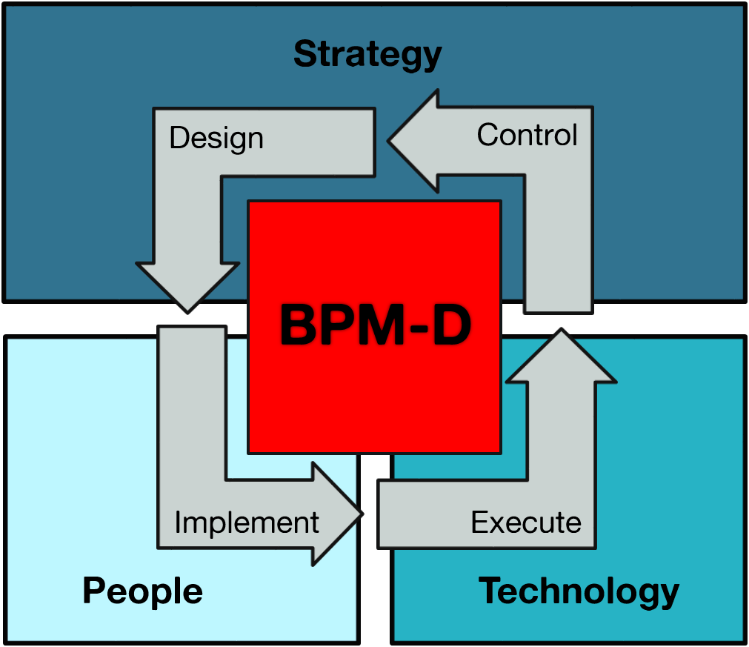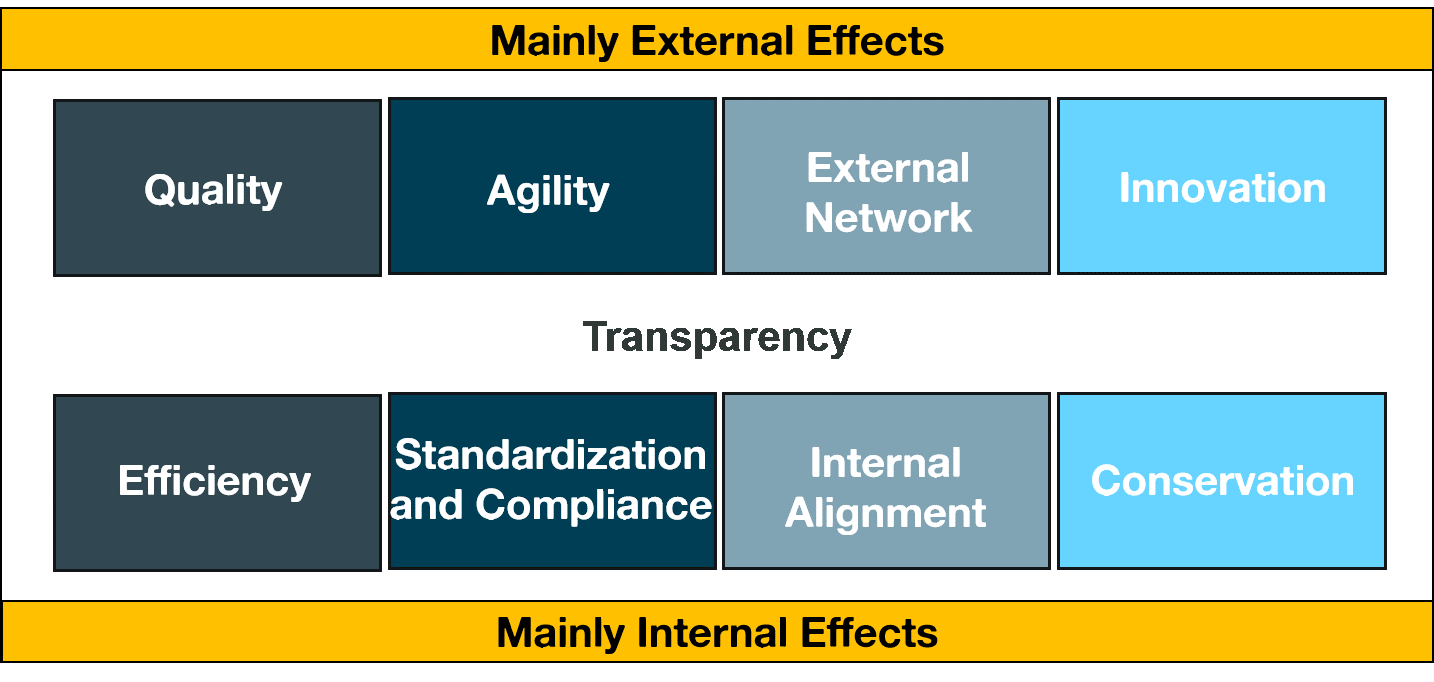As a recent research study of The Gartner Group shows, only 13% of business meets their strategic goals [1]. This means 87% of organizations prepare strategic plans and related objectives —but they don’t deliver on their strategy, at least not fully. This situation will get even more challenging with the intensifying digitalization and the adjustment of strategies to this trend. Less than 1% of companies have prepared their business processes to realize the potential of our digital world according to the same study. Hence the risk of not executing successfully on a business strategy incorporating the opportunities of digitalization becomes even higher. A just release study by BPM-D, Widener University and the Universidad de Chile demonstrates that over 55% of companies have issues finding the right opportunities to benefit from digitalization or struggle with the resistance to change and the slow decision making [2].
The discipline of Business Process Management (BPM) addresses those issues [3]. It helps organizations targeting value in a digital world through cross-functional integrated business and technology initiatives. BPM has become the management discipline for strategy execution, the “strategy execution engine”. To execute strategy effectively and deal proactively with the opportunities of our digital world, organizations must understand how and when to modify or enhance their business processes. They need to know which processes are best candidates for intervention to benefit from opportunities, like new forms of digitalization, and respond to threats of our volatile business environment.
Managing processes for strategy execution demands a robust and thorough management discipline. This BPM-Discipline is implemented through the “process of process management”. It enables organizations to deal with change successfully, drive their growth agenda and create immediate and lasting competitive advantage.
Existing approaches to BPM usually focus on one or very few aspects of process management, e.g. improving isolated processes, implementing a process automation engine or setting up enterprise architecture. However, experience has shown that there is a need for a comprehensive overarching approach to identify and establish all process management components required to form a simple but successful BPM-Discipline in the context of a specific organization. It is about identifying the right focus to avoid “boiling the ocean”, applying the appropriate improvement approaches and sustaining the process management results by measuring and adjusting processes over time. The BPM-Discipline moves strategy into people and technology based execution as shown in figure 1. This is achieved through a systematic management of the lifecycle of a business process.

Figure 1: BPM-D® Framework: The BPM-Discipline – Transferring Strategy into Execution
For many years practitioners questioned the value of BPM, but in the last few years this situation has changed. Now most leaders have begun to understand the value proposition and the broader dimension of BPM; the challenge has become how to establish BPM in an organization in a pragmatic but systematic way with minimal up-front investment. To resolve this issue, we can look at other management disciplines and how they are implemented. For example, the discipline of Human Resources is introduced into an organization through the appropriate HR processes, like the hiring process, performance evaluation or promotion process. Similarly, you can implement a BPM-Discipline through the “process of process management”, the BPM process. You address the BPM-Discipline just like any other management discipline. If you interpret the BPM-Discipline as process itself, you can apply all the process management approaches, methods and tools to it – enabling an efficient and outcome-driven approach. The process of process management operationalize the concept of the BPM-Discipline. It applies the principles of BPM to itself.
Research involving over 90 organizations around the world of different sizes and in different industries has shown that the transparency BPM brings is a key outcome it delivers and basis for strategy execution. One the one hand, transparency is a value by itself; a clear view of organizational processes enables fast and well-informed decisions which are crucial for the success of a company in our fast changing business environment. On the other hand BPM and the transparency it provides also helps to achieve other key values and enables the efficient management of the trade-offs between those values.
Four key “value-pairs” have been identified — all important for systematic strategy execution. These value are illustrated in the BPM-D Value-Framework in figure 2.

Figure 2: BPM-D® Value-Framework
This is best illustrated by an example. A company wants to improve its call center process. It identifies that only a few sub-processes are really relevant for clients to the extent that they have a willingness to pay a service fee for them. So, you improve these sub-processes focused on “quality” aspects. Other sub-processes are more administrative; clients don’t really care about them but they are important and need to be executed well. Hence the prime focus on these processes is on “efficiency”, mainly cost and time aspects, using appropriate BPM capabilities.
BPM creates the transparency required to achieve both values resulting in the highest quality where it matters and the best efficiency where this counts most. BPM helps to identify where it is really worth thinking of process innovation or sophisticated optimization and where you can conserve existing good practices. Since an organization only competes with 15-20% of its processes, it is key to identify where innovation and optimization pay off. This is again possible though the transparency BPM delivers.
So, how do you establish such a process of process management for strategy execution fast and at low risk? That’s where a reference model, such as the BPM-D Framework, can be used effectively. Such a reference framework helps to identify what BPM capabilities your organization needs to implement to address key issues. For example, one of those BPM capabilities is about “targeting value”. This is the capability to identify high impact low maturity business processes that are most important targets for improvements to implement the business strategy. Once the value-targets have been identified, other BPM capabilities are selected that are required to innovate, optimize or standardize those high impact processes – and to sustain the improvement results. Those BPM capabilities enable focused business and technology initiatives across functions, required to execute an organization’s overall strategy. Through the BPM-Discipline organizations are able to create an end-to-end “value network” around the existing organizational structure.
The systematic implementation of the right process of process management results in a value-driven management discipline which transfers strategy effectively into people and technology based execution—at pace with certainty, using the opportunities of our digital world. The BPM-Discipline becomes the strategy execution engine.
References
[1] Cantara: Start up your Business Process Competency Center. In: Documentation of The Gartner Business Process Management Summit, National Harbor 2015.[2] Kirchmer, M., Franz, P., Lotterer, A., Antonucci, Y., Laemgle, S.: The Vaoue-Switch for Digital Initiatives: Business Process Management. BPM-D Whitepaper, Philadelphia, London, 2016.[3] Kirchmer, M., Franz, P.: The Process of Process Management – Strategy Execution in a Digital World. BPM-D Whitepaper, Philadel[hia, London, 2015.

















